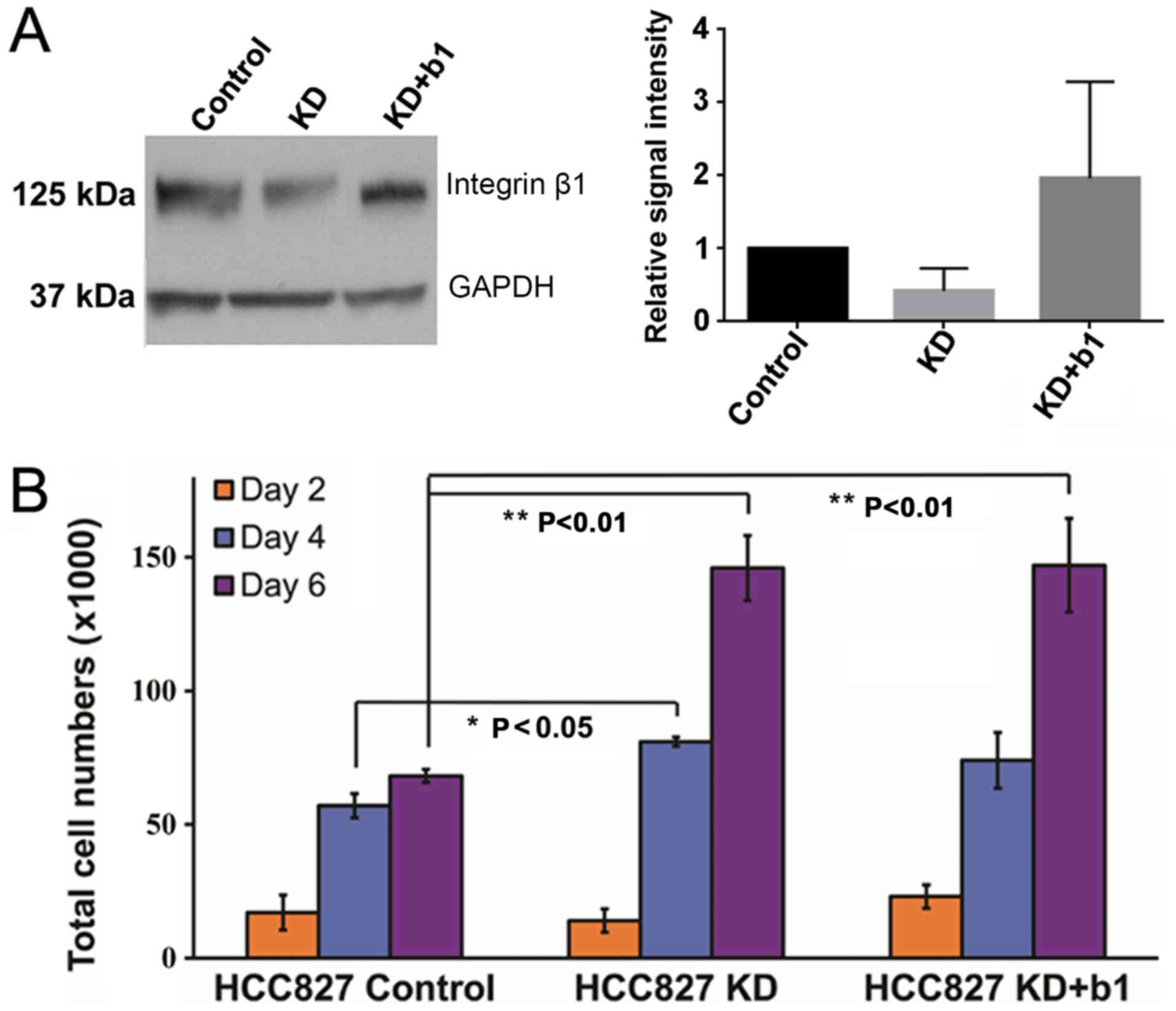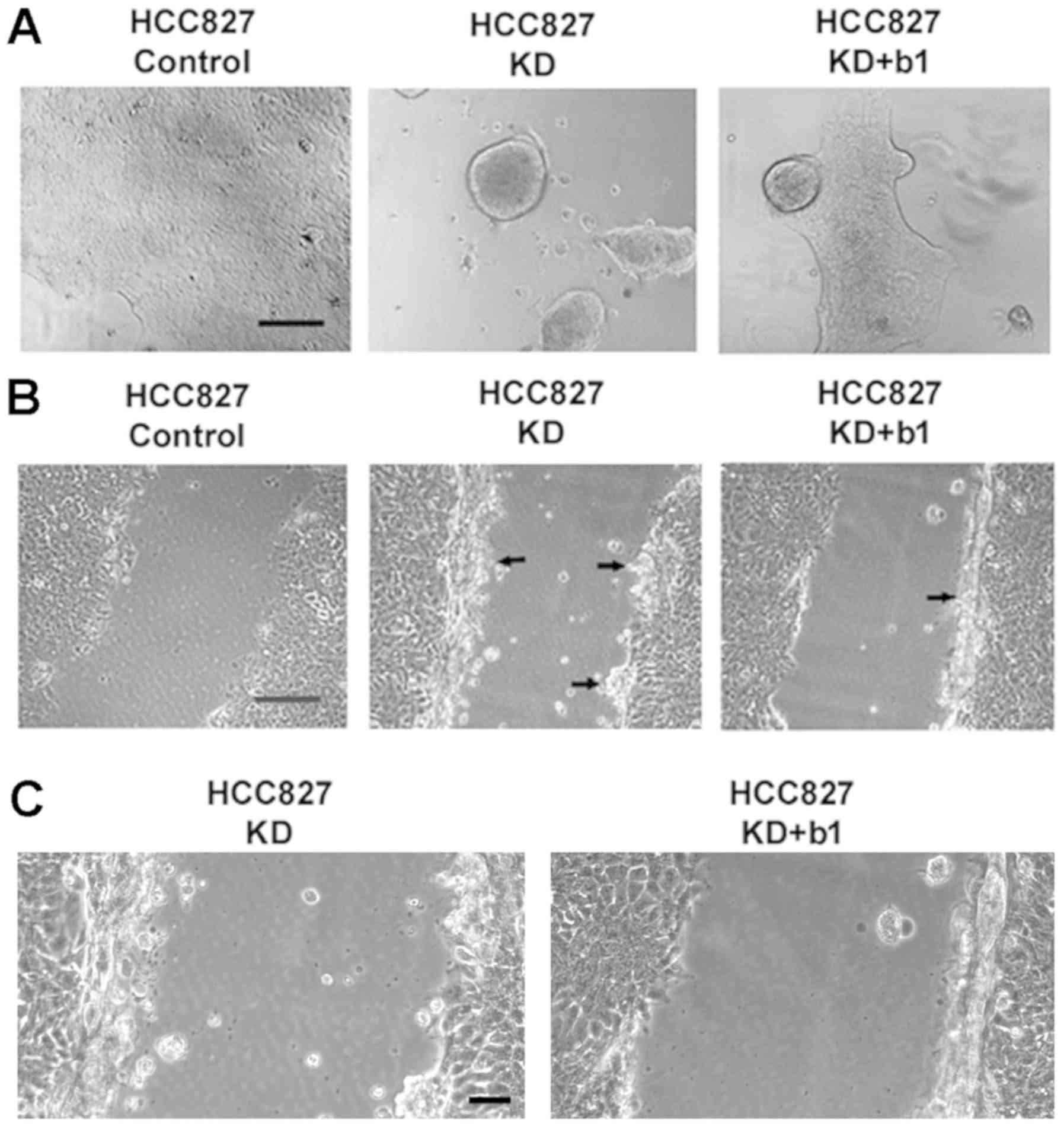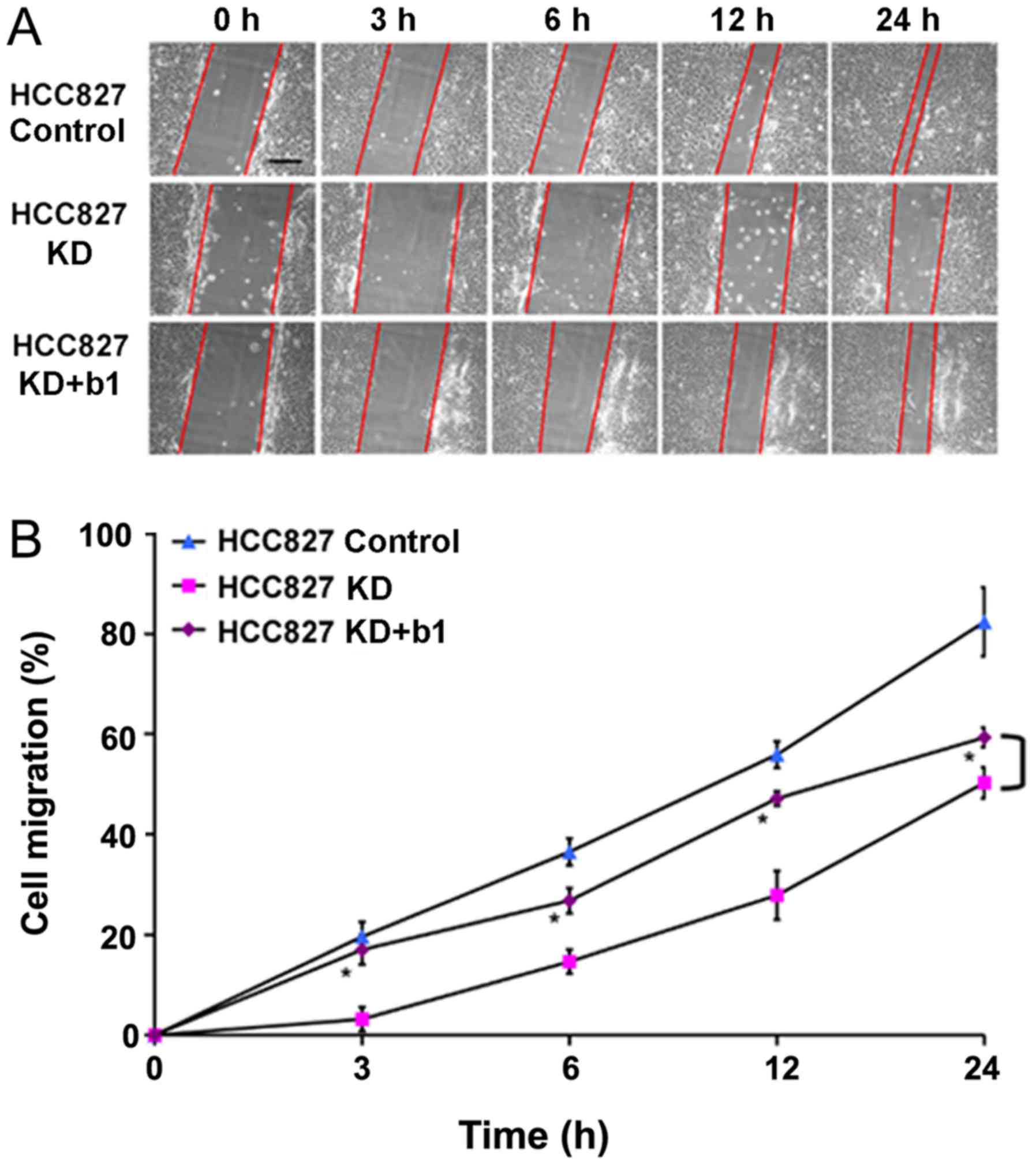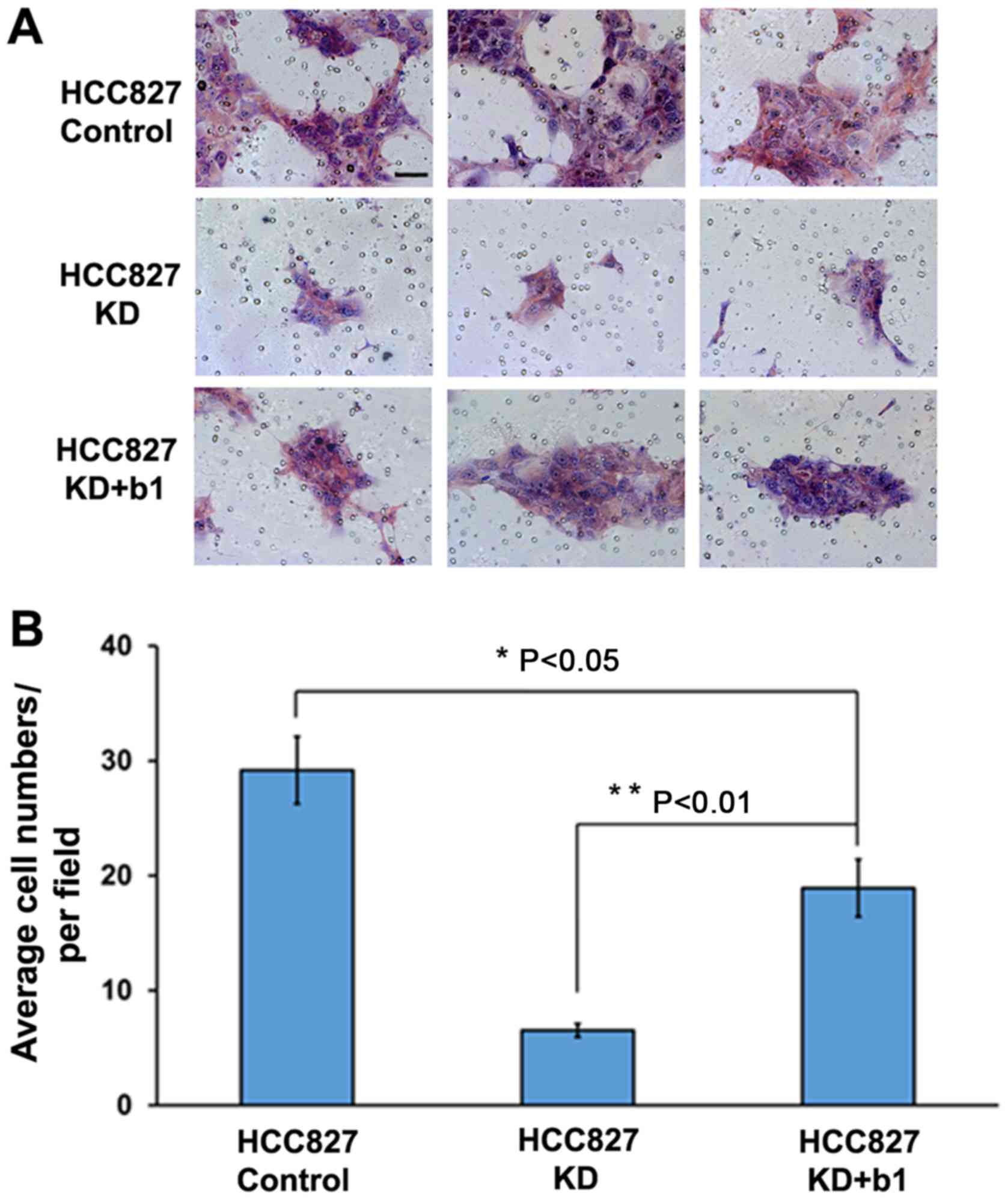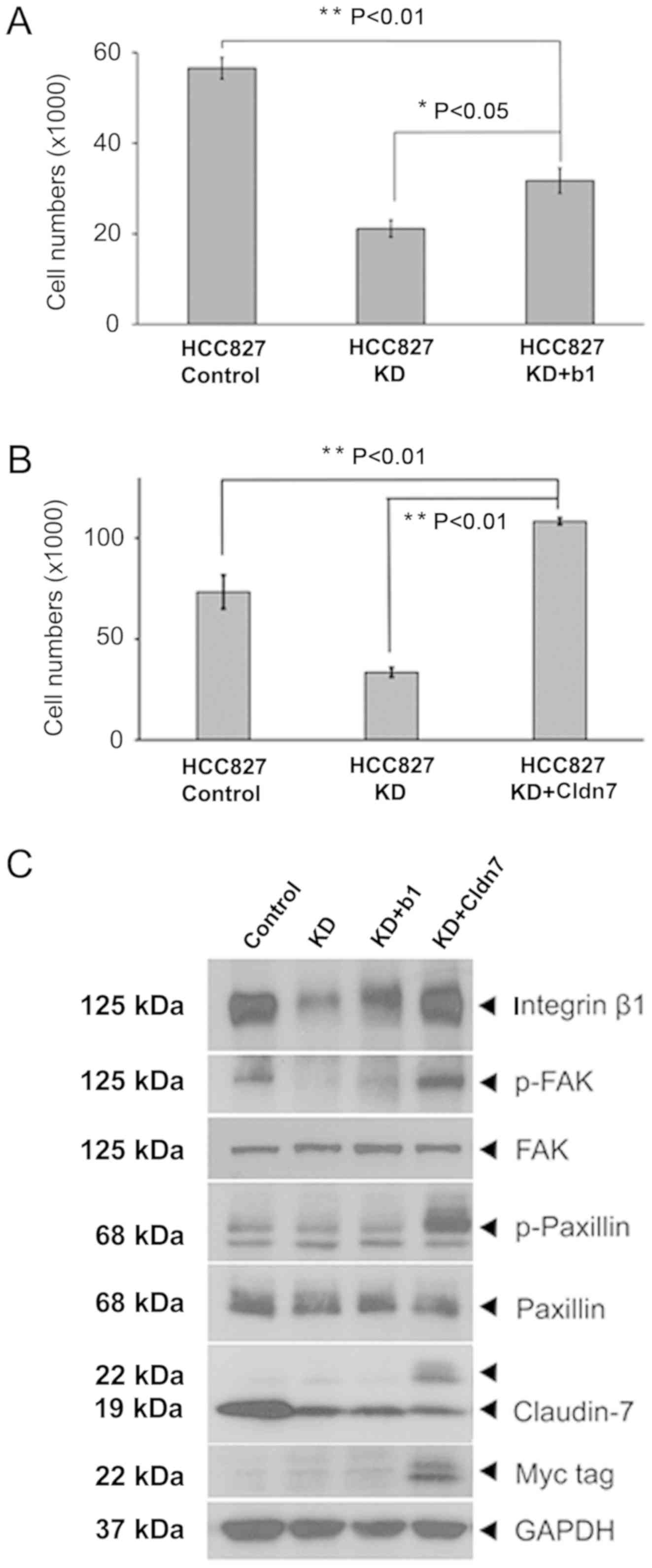|
1
|
Siegel R, Naishadham D and Jemal A: Cancer
statistics, 2012. CA Cancer J Clin. 62:10–29. 2012. View Article : Google Scholar : PubMed/NCBI
|
|
2
|
Soini Y: Tight junctions in lung cancer
and lung metastasis: A review. Int J Clin Exp Pathol. 5:126–136.
2012.PubMed/NCBI
|
|
3
|
Chang EH, Pezzulo AA and Zabner J: Do cell
junction protein mutations cause an airway phenotype in mice or
humans? Am J Respir Cell Mol Biol. 45:202–220. 2011. View Article : Google Scholar : PubMed/NCBI
|
|
4
|
Gunzel D and Yu AS: Claudins and the
modulation of tight junction permeability. Physiol Rev. 93:525–569.
2013. View Article : Google Scholar : PubMed/NCBI
|
|
5
|
Philip R, Heiler S, Mu W, Büchler MW,
Zöller M and Thuma F: Claudin-7 promotes the epithelial-mesenchymal
transition in human colorectal cancer. Oncotarget. 6:2046–2063.
2015. View Article : Google Scholar : PubMed/NCBI
|
|
6
|
Bhat AA, Pope JL, Smith JJ, Ahmad R, Chen
X, Washington MK, Beauchamp RD, Singh AB and Dhawan P: Claudin-7
expression induces mesenchymal to epithelial transformation (MET)
to inhibit colon tumorigenesis. Oncogene. 34:4570–4580. 2015.
View Article : Google Scholar : PubMed/NCBI
|
|
7
|
Morin PJ: Claudin proteins in human
cancer: Promising new targets for diagnosis and therapy. Cancer
Res. 65:9603–9606. 2005. View Article : Google Scholar : PubMed/NCBI
|
|
8
|
Escudero-Esparza A, Jiang WG and Martin
TA: Claudin-5 is involved in breast cancer cell motility through
the N-WASP and ROCK signalling pathways. J Exp Clin Cancer Res.
31:432012. View Article : Google Scholar : PubMed/NCBI
|
|
9
|
Yamamoto T, Oshima T, Yoshihara K,
Yamanaka S, Nishii T, Arai H, Inui K, Kaneko T, Nozawa A, Woo T, et
al: Reduced expression of claudin-7 is associated with poor outcome
in non-small cell lung cancer. Oncol Lett. 1:501–505. 2010.
View Article : Google Scholar : PubMed/NCBI
|
|
10
|
Lu Z, Kim DH, Fan J, Lu Q, Verbanac K,
Ding L, Renegar R and Chen YH: A non-tight junction function of
claudin-7-Interaction with integrin signaling in suppressing lung
cancer cell proliferation and detachment. Mol Cancer. 14:1202015.
View Article : Google Scholar : PubMed/NCBI
|
|
11
|
Poon CE, Madawala RJ, Day ML and Murphy
CR: Claudin 7 is reduced in uterine epithelial cells during early
pregnancy in the rat. Histochem Cell Biol. 139:583–593. 2013.
View Article : Google Scholar : PubMed/NCBI
|
|
12
|
Gonzalez-Mariscal L, Namorado Mdel C,
Martin D, Sierra G and Reyes JL: The tight junction proteins
claudin-7 and −8 display a different subcellular localization at
Henle's loops and collecting ducts of rabbit kidney. Nephrol Dial
Transplant. 21:2391–2398. 2006. View Article : Google Scholar : PubMed/NCBI
|
|
13
|
Blackman B, Russell T, Nordeen SK, Medina
D and Neville MC: Claudin 7 expression and localization in the
normal murine mammary gland and murine mammary tumors. Breast
Cancer Res. 7:R248–R255. 2005. View
Article : Google Scholar : PubMed/NCBI
|
|
14
|
Srichai MB and Zent R: Integrin structure
and function. Cell-Extracellular Matrix Interactions in Cancer.
Zent R and Pozzi A: Springer; New York, New York, NY: pp. 19–41.
2010, View Article : Google Scholar
|
|
15
|
Liu S, Xu SW, Blumbach K, Eastwood M,
Denton CP, Eckes B, Krieg T, Abraham DJ and Leask A: Expression of
integrin beta1 by fibroblasts is required for tissue repair in
vivo. J Cell Sci. 123:3674–3682. 2010. View Article : Google Scholar : PubMed/NCBI
|
|
16
|
Li N, Zhang Y, Naylor MJ, Schatzmann F,
Maurer F, Wintermantel T, Schuetz G, Mueller U, Streuli CH and
Hynes NE: Beta1 integrins regulate mammary gland proliferation and
maintain the integrity of mammary alveoli. EMBO J. 24:1942–1953.
2005. View Article : Google Scholar : PubMed/NCBI
|
|
17
|
Parvani JG, Galliher-Beckley AJ, Schiemann
BJ and Schiemann WP: Targeted inactivation of β1 integrin induces
β3 integrin switching, which drives breast cancer metastasis by
TGF-β. Mol Biol Cell. 24:3449–3459. 2013. View Article : Google Scholar : PubMed/NCBI
|
|
18
|
Bravo-Cordero JJ, Magalhaes MA, Eddy RJ,
Hodgson L and Condeelis J: Functions of cofilin in cell locomotion
and invasion. Nat Rev Mol Cell Biol. 14:405–415. 2013. View Article : Google Scholar : PubMed/NCBI
|
|
19
|
Bouvard D, Pouwels J, De Franceschi N and
Ivaska J: Integrin inactivators: Balancing cellular functions in
vitro and in vivo. Nat Rev Mol Cell Biol. 14:430–442. 2013.
View Article : Google Scholar : PubMed/NCBI
|
|
20
|
Murphy DA and Courtneidge SA: The ‘ins’
and ‘outs’ of podosomes and invadopodia: Characteristics, formation
and function. Nat Rev Mol Cell Biol. 12:413–426. 2011. View Article : Google Scholar : PubMed/NCBI
|
|
21
|
Branch KM, Hoshino D and Weaver AM:
Adhesion rings surround invadopodia and promote maturation. Biol
Open. 1:711–722. 2012. View Article : Google Scholar : PubMed/NCBI
|
|
22
|
Magalhaes MA, Larson DR, Mader CC,
Bravo-Cordero JJ, Gil-Henn H, Oser M, Chen X, Koleske AJ and
Condeelis J: Cortactin phosphorylation regulates cell invasion
through a pH-dependent pathway. J Cell Biol. 195:903–920. 2011.
View Article : Google Scholar : PubMed/NCBI
|
|
23
|
Furugaki K, Moriya Y, Iwai T, Yorozu K,
Yanagisawa M, Kondoh K, Fujimoto-Ohuchi K and Mori K: Erlotinib
inhibits osteolytic bone invasion of human non-small-cell lung
cancer cell line NCI-H292. Clin Exp Metastasis. 28:649–659. 2011.
View Article : Google Scholar : PubMed/NCBI
|
|
24
|
Hoggard J, Fan J, Lu Z, Lu Q, Sutton L and
Chen YH: Claudin-7 increases chemosensitivity to cisplatin through
the upregulation of caspase pathway in human NCI-H522 lung cancer
cells. Cancer Sci. 104:611–618. 2013. View Article : Google Scholar : PubMed/NCBI
|
|
25
|
Kuhn S, Koch M, Nübel T, Ladwein M,
Antolovic D, Klingbeil P, Hildebrand D, Moldenhauer G, Langbein L,
Franke WW, et al: A complex of EpCAM, claudin-7, CD44 variant
isoforms, and tetraspanins promotes colorectal cancer progression.
Mol Cancer Res. 5:553–567. 2007. View Article : Google Scholar : PubMed/NCBI
|
|
26
|
Ladwein M, Pape UF, Schmidt DS, Schnölzer
M, Fiedler S, Langbein L, Franke WW, Moldenhauer G and Zöller M:
The cell-cell adhesion molecule EpCAM interacts directly with the
tight junction protein claudin-7. Exp Cell Res. 309:345–357. 2005.
View Article : Google Scholar : PubMed/NCBI
|
|
27
|
Zheng J, Xie Y, Campbell R, Song J,
Massachi S, Razi M, Chiu R, Berenson J, Yang OO, Chen IS and Pang
S: Involvement of claudin-7 in HIV infection of CD4(−) cells.
Retrovirology. 2:792005. View Article : Google Scholar : PubMed/NCBI
|
|
28
|
Leblond V, Legendre C, Gras G,
Dereuddre-Bosquet N, Lafuma C and Dormont D: Quantitative study of
beta1-integrin expression and fibronectin interaction profile of T
lymphocytes in vitro infected with HIV. AIDS Res Hum Retroviruses.
16:423–433. 2000. View Article : Google Scholar : PubMed/NCBI
|















